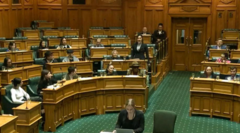The recent vote paves the way for France to potentially join other EU nations in allowing assisted dying, but ethical concerns remain at the forefront of the discussion.
French Assembly Moves Forward with Assisted Dying Legislation

French Assembly Moves Forward with Assisted Dying Legislation
The French National Assembly approves a bill for assisted dying for terminally ill patients, with widespread debate expected.
In a landmark decision, the French National Assembly voted to authorize assisted dying for eligible individuals battling terminal illnesses. The bill, which gained the backing of President Emmanuel Macron, passed with a vote of 305 to 199. It now progresses to the Senate before returning for a second reading in the Assembly. Advocates are optimistic about its potential enactment by 2027, positioning France as the eighth EU nation to recognize a form of assisted dying.
The proposed legislation distinguishes itself from more permissive models seen in the Netherlands or Belgium, focusing specifically on those suffering from serious, incurable diseases in advanced stages. Patient eligibility stipulates that individuals must be enduring constant physical or psychological pain and must be able to "freely manifest" their wish to pursue assisted dying; they would then face a 48-hour waiting period before confirmation.
President Macron heralded these legislative advancements as "an important step" in addressing sensitive societal issues through a message shared on social media. During the heated two-week debate, the focus on qualifying conditions dominated discussions. Lawmakers from diverse political backgrounds contributed to a complex debate, wherein center and left representatives supported the bill while the right wing expressed reservations about its broad definitions, fearing it may lead to the premature ending of lives.
Opponents, including some from the Catholic community, raised concerns about vulnerable groups being pressured to choose death as a relief for their families. Outside the Assembly, demonstrators voiced their worries, reflecting the nuanced perspectives held by French citizens. Advocates on the left sought to widen the scope to include more individuals, but their proposals faced pushback.
In an effort to maintain conscientious objection, medical personnel opposed to assisted dying would not be required to participate, although measures against obstructing the procedure were introduced. These elements of the legislation underscore the continuing ethical dilemmas surrounding the topic of assisted dying in France, as society grapples with its implications for vulnerable populations.
The proposed legislation distinguishes itself from more permissive models seen in the Netherlands or Belgium, focusing specifically on those suffering from serious, incurable diseases in advanced stages. Patient eligibility stipulates that individuals must be enduring constant physical or psychological pain and must be able to "freely manifest" their wish to pursue assisted dying; they would then face a 48-hour waiting period before confirmation.
President Macron heralded these legislative advancements as "an important step" in addressing sensitive societal issues through a message shared on social media. During the heated two-week debate, the focus on qualifying conditions dominated discussions. Lawmakers from diverse political backgrounds contributed to a complex debate, wherein center and left representatives supported the bill while the right wing expressed reservations about its broad definitions, fearing it may lead to the premature ending of lives.
Opponents, including some from the Catholic community, raised concerns about vulnerable groups being pressured to choose death as a relief for their families. Outside the Assembly, demonstrators voiced their worries, reflecting the nuanced perspectives held by French citizens. Advocates on the left sought to widen the scope to include more individuals, but their proposals faced pushback.
In an effort to maintain conscientious objection, medical personnel opposed to assisted dying would not be required to participate, although measures against obstructing the procedure were introduced. These elements of the legislation underscore the continuing ethical dilemmas surrounding the topic of assisted dying in France, as society grapples with its implications for vulnerable populations.






















